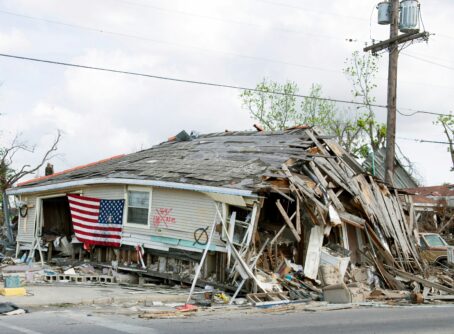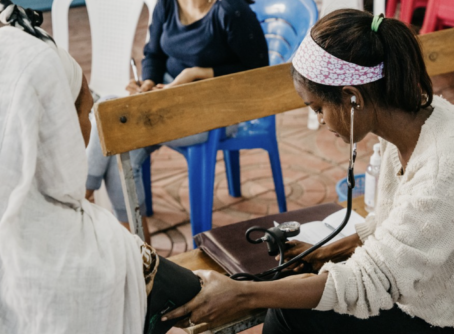
This article is part of our series looking at the Invisible Social Safety Net — all of those houses of worship and faith-based organizations that provide essential social services to their communities, sometimes with the help of government funding and sometimes without that assistance. In order to unleash the power of the social safety net to support our most vulnerable neighbors, CPJ advocates for state, local, and federal governments who need to understand how to partner with and support these “invisible” links who serve not because they have to by law, but because faithfulness to their tradition calls them to serve.
The money was coming up short, and Alex doubted whether his family would be able to afford a funeral for his grandmother Betya. Betya, a Holocaust survivor, had just gone into hospice at the age of 96, and Alex wanted to ensure that her final moments would be ones of comfort and care, not anguish. Fortunately, the funeral home that Alex’s fiancé, Kailey, had contacted referred them to Yad Chessed, a burgeoning Jewish nonprofit in Massachusetts providing aid to the financially distressed.
It is of the utmost encouragement that no one religion or culture holds a monopoly on philanthropy. Something deep in the human heart yearns for mutual ties of neighborliness and weeps at the obstacles in the way: poverty, discrimination, violence, indifference, and divisions of all sorts. In this article series, we have been highlighting the diversity of social services in the United States, and this piece explores the ways social service manifests itself in the Jewish American community.
Jewish Demographics in the United States
According to the Pew Research Center in 2020, self-identified Jewish adults comprised 2.4% of the U.S. population (or 5.8 million people), and 3.2% of children in the U.S. (or 2.4 million children) were living with a Jewish adult. In 2020, 26% of Jews in the U.S. struggled to cover essential expenses, such as medical bills, food, and rent, and this situation was exacerbated by the COVID-19 pandemic. Moreover, the severity of need varies from community to community. For example, the Jewish community that Yad Chessed serves suffers under these statistics: 75% live on $24,000 or less per year, and 50% of households with children have only one parent.
Origins of Jewish Philanthropy
Historically, Jewish culture stands upon a rich tradition of charity and neighborliness, virtues that can be traced in the Jewish Scriptures and traditional writings. The truth that the image of God inhabits every human without discrimination (Genesis 1:27) serves as a powerful impetus to Jewish philanthropy. The aforementioned Jewish nonprofit, Yad Chessed (literally, “Hand of Loving Kindness”), based in Waltham, Massachusetts, that delivers holistic economic aid to community members in financial distress, says, “Guided by our Jewish values and the concept that all human beings are created ‘btzelem elokim’ (in G-d’s image), we listen with compassion, respect, and without judgment. For some who are truly alone, a Yad Chessed social worker is the only ear they can rely on.” Such listening serves as the trustworthy foundation for generous and wisely discerned giving.
Such listening serves as the trustworthy foundation for generous and wisely discerned giving.
Moreover, God directly commands acts of neighborly love in the Jewish Scriptures. In Deuteronomy 15:11, for example, God commands Israel to “open wide your hand to your brother, to the needy and to the poor, in your land.” Concerning foreigners, the mandate of love still stands: “You shall treat the stranger who sojourns with you as the native among you, and you shall love him as yourself…” Thus, the act of opening one’s hand to one’s neighbor is central to the Jewish community, for it is mandated, not only by the image of God in each human but also by the authority of God’s very voice.
Jewish extra-Scriptural literature also details the responsibility of giving. Maimonides, a Jewish philosopher of the 12th century, developed a code for tzedakah (a Hebrew term that refers to acts of justice, charity, and righteousness), comprising eight levels of increasing tzedakah. The lowest level is reluctant giving with no further action, while the highest level is free giving, specifically directed towards helping the receiver of funds become self-sufficient in the community. The highest tzedakah not only meets basic particular needs at present but also looks to the future development of both individuals and communities.
Nancy Kriegel, Yad Chessed’s Executive Director, emphasized the fundamentality of neighborly love to Jewish culture: “It [lovingkindness] really is in our Jewish DNA. It goes back to Biblical times to take care of the most vulnerable among us. That is part of the Jewish tradition,”* she told CPJ. Nancy went on to describe the philosophy of “Tikkun ‘olam” in Jewish society, which means “to repair the world” in Hebrew—a mindset of actively pursuing the world’s welfare, “Tikkun ‘olam is about the world at large, not just Jewish need. It’s about how we as Jewish people contribute to what we know is a broken world and what part we can play in repairing that world.”* Despite being a complex group that transcends ordinary ethno-national titles, Jewish people live with a common undercurrent of kindness to others. This kindness looks and feels different in each Jewish community, but something of its essence remains.
Exhibit A: Yad Chessed
In June of this year, Yad Chessed appeared as the cover story for the Jewish Journal Of Greater Boston. The story gave a sampling of the broad community impact that Yad Chessed was making in Massachusetts’s Jewish communities. Yad Chessed helped families pay rent, mortgage, and food bills in times of financial crisis, delivered Jewish holiday meals to Jews unable to afford them, and aided a widowed man who had recently lost his job in removing a fallen tree from his well. Furthermore, Yad Chessed maintains ongoing relationships with funeral homes, family services, and food market organizations, and these organizations often refer clients to Yad Chessed. Many people also find Yad Chessed via word of mouth.*
Yad Chessed devotes over 80% of its funds to charitable services, with a majority of these funds going towards food support (42%) and client counseling/program expenses (36%). The remainder is used for important services such as funerals, housing, transportation, and medical expenses. In the fiscal year 2023, Yad Chessed assisted 2,119 individuals with services amounting to $731,635, which is a significant increase from the fiscal year 2020 (1,629 individuals assisted with services amounting to $595,347), indicating that the impact of Yad Chessed is growing.
Yad Chessed has also blessed families impacted by the Israel-Palestine armed conflict. Yad Chessed’s 2023 Impact Report details the story of Sivan, an Israeli mother residing in Boston when her husband had to return to Israel to serve in the Israel Defense Forces. They had a daughter enrolled in school, and finances became tight. Yad Chessed provided much-needed aid in the form of grocery gift cards and social work guidance counseling.
Yad Chessed has a much more narrow mission that focuses on just Jewish need…it’s very hard for you to be looking outward if you haven’t first repaired your own
Yad Chessed focuses particularly on the needs of the local Jewish community. Nancy Kriegel explains: “Yad Chessed has a much more narrow mission that focuses on just Jewish need…it’s very hard for you to be looking outward if you haven’t first repaired your own.”* In other words, Yad Chessed remembers and serves the needs of people existing right at the doorstep, for Tikkun ‘olam begins with the people closest to oneself.* But Yad Chessed will by no means turn away non-Jewish people asking for help: “If somebody took the time and brought up the courage to call us, we never want them to hear just no.”* When a non-Jewish person asks for a moderate, one-off amount of money, Yad Chessed does not hesitate to provide, and when the situation is more complicated, Yad Chessed will guide them to the right community resources.*
Exhibits B-Z
Yad Chessed, though unique, is not the only Jewish nonprofit centered around lovingkindness. A few more to note: the Hebrew Immigrant Aid Society (HIAS), has a history trailing as far back as the late 1800s, when its predecessor organizations were sheltering and relocating persecuted Jews fleeing from Eastern Europe. In the present, HIAS provides holistic aid for refugees and asylum seekers worldwide. Such aid includes long-term economic development plans (such as giving microloans for refugee-owned businesses), free legal representation to combat government policies of refugee exclusion, and partnering with women-led organizations and LGBTQ communities to oppose gender-based violence towards female or LGBTQ immigrants. Moreover, though HIAS originated in aiding specifically Jewish persecuted communities, HIAS fights for refugees of all nationalities to find a home. In the Jewish journal, Forward, Gal Beckerman wrote (in 2009) that 80% of HIAS-assisted refugees were non-Jewish, including Darfuri, Somali, Burundian, Burmese, and Iranian.
One can also find Jewish family services organizations and Jewish federation organizations all across the U.S. For example, a person residing in Cincinnati, OH, has convenient access to the Jewish Federation of Cincinnati (JFC), an organization devoted to increasing the coherence of the Jewish community in Cincinnati via programs ranging from self-care cooking classes to multi-day Jewish art exhibitions. In fact, JFC spent $27 million (88% of their 2023 budget) on programs and grants last year. A Cincinnatian can also easily find Jewish family service agencies, such as the one on Kenwood Road, which provides services ranging from mental health treatment to elder care.
Jewish Philanthropy and Public Justice
The Center For Public Justice utilizes a public justice framework in addressing the socio-political issues of the day. The concept of public justice is two-fold. First, governments hold a unique responsibility and capacity to address societal needs. Second, governments must respect the unique responsibilities and capacities of other social organizations (such as families, businesses, houses of worship, etc.) in addressing societal needs. A community needs the tension of respect and mutual support to exist among its diverse social organizations to adequately support its people, serving as a safety net in times of crisis and a firm foundation in times of growth and thriving.
Jewish philanthropic organizations, as detailed above, have done and are doing much in the preservation and development of communities in America via a plethora of services that effectively address the pressing needs of community members. By doing so, such organizations are contributing to the public welfare, the ultimate concern of the government. Governments must be invested in such work, actively pursuing channels of synergy where the best skills of both government can mesh efficiently for the flourishing of society. Governments can start by raising awareness of the particular needs of Jewish communities and by combating Jewish stereotypes. Nancy Kriegel says, “Raising awareness is a gift to the world. There are so many people not aware of what’s going on on a day-to-day basis [in the Jewish community].” Lack of awareness of needs in the Jewish community along with misperceptions of Jewish people as being inherently rich or powerful only exacerbates the pressing needs of over 1 million Jewish people.
Governments must be invested in such work, actively pursuing channels of synergy where the best skills of both government can mesh efficiently for the flourishing of society.
The Memory of Good
At the end of my interview with Nancy Kriegel, she shared with me a thank-you note from one of Yad Chessed’s clients: “When you’re poor and always moving, it’s hard to feel a part of the Jewish community, but Yad Chessed helps us feel connected. Even when we light the Sabbath candles alone, we know that Yad Chessed is lighting a flame within us…”* To feel connected to one’s community is the ultimate end of social safety nets and services. May acts of lovingkindness continue to light a flame, not only within Jewish communities in Massachusetts but throughout the entire world! Tikkun ‘olam.
* indicates where an author spoke with a source directly
Kyle Chu is a graduate from Messiah University with a degree in Political Science and International Relations, along with a minor in music and in statistics. His passions span many areas, including, first and foremost, family and loved ones, foreign languages (Chinese, Latin, and Biblical Greek and Hebrew), omnivorous reading, multicultural eating, playing and composing music, house remodeling, jiu jitsu and calisthenics, and creating planted aquariums.





